NEW YORK (AP) — Donald Trump’s lawyers are asking a New York judge to lift the gag order that barred the former president from commenting about witnesses, jurors and others tied to the criminal case that led to his conviction for falsifying records to cover up a potential sex scandal.
In a letter Tuesday, Trump lawyers Todd Blanche and Emil Bove asked Judge Juan M. Merchan to end the gag order, arguing there is nothing to justify “continued restrictions on the First Amendment rights of President Trump” now that the trial is over.
Among other reasons, the lawyers said Trump is entitled to “unrestrained campaign advocacy” in light of President Joe Biden’s public comments about the verdict last Friday, and continued public criticism of him by his ex-lawyer Michael Cohen and porn actor Stormy Daniels, both key prosecution witnesses.
Trump’s lawyers also contend the gag order must go away so he’s free to fully address the case and his conviction with the first presidential debate scheduled for June 27.
The Manhattan district attorney’s office declined to comment.
Merchan issued Trump’s gag order on March 26, a few weeks before the start of the trial, after prosecutors raised concerns about the presumptive Republican presidential nominee’s propensity to attack people involved in his cases.
Merchan later expanded it to prohibit comments about his own family after Trump made social media posts attacking the judge’s daughter, a Democratic political consultant. Comments about Merchan and District Attorney Alvin Bragg are allowed, but the gag order bars statements about court staff and members of Bragg’s prosecution team.
Trump was convicted Thursday of 34 counts of falsifying business records arising from what prosecutors said was an attempt to cover up a hush money payment to Daniels just before the 2016 election. She claims she had a sexual encounter with Trump a decade earlier, which he denies. He is scheduled to be sentenced July 11.
Prosecutors had said they wanted the gag order to “protect the integrity of this criminal proceeding and avoid prejudice to the jury.” In the order, Merchan noted prosecutors had sought the restrictions “for the duration of the trial." He did not specify when they would be lifted.
Blanche told the Associated Press last Friday that it was his understanding the gag order would expire when the trial ended and that he would seek clarity from Merchan, which he did on Tuesday.
“It’s a little bit of the theater of the absurd at this point, right? Michael Cohen is no longer a witness in this trial,” Blanche told the AP. “The trial is over. The same thing with all the other witnesses. So, we’ll see. I don’t mean that in any way as being disrespectful of the judge and the process. I just want to be careful and understand when it no longer applies.”
Trump has continued to operate under the belief that he’s still muzzled, telling reporters Friday at Trump Tower: “I’m under a gag order, nasty gag order.”
Referring to Cohen, Trump said, “I’m not allowed to use his name because of the gag order” before slamming his former lawyer-turned-courtroom foe as “a sleazebag.”
During the trial, Merchan held Trump in contempt of court, fined him $10,000 for violating the gag order and threatened to put him in jail if he did it again.
Trump’s use of the term “sleazebag” to describe Cohen just before the trial rankled prosecutors, but was not considered a gag order violation by the judge. Merchan declined to sanction Trump for an April 10 social media post, which referred to Cohen and Daniels, another key prosecution witness, by that insult.
The judge said at the time that Trump’s contention that he was responding to previous posts by Cohen that were critical of him “is sufficient to give” him pause on whether prosecutors met their burden in demonstrating that the post was out of bounds.
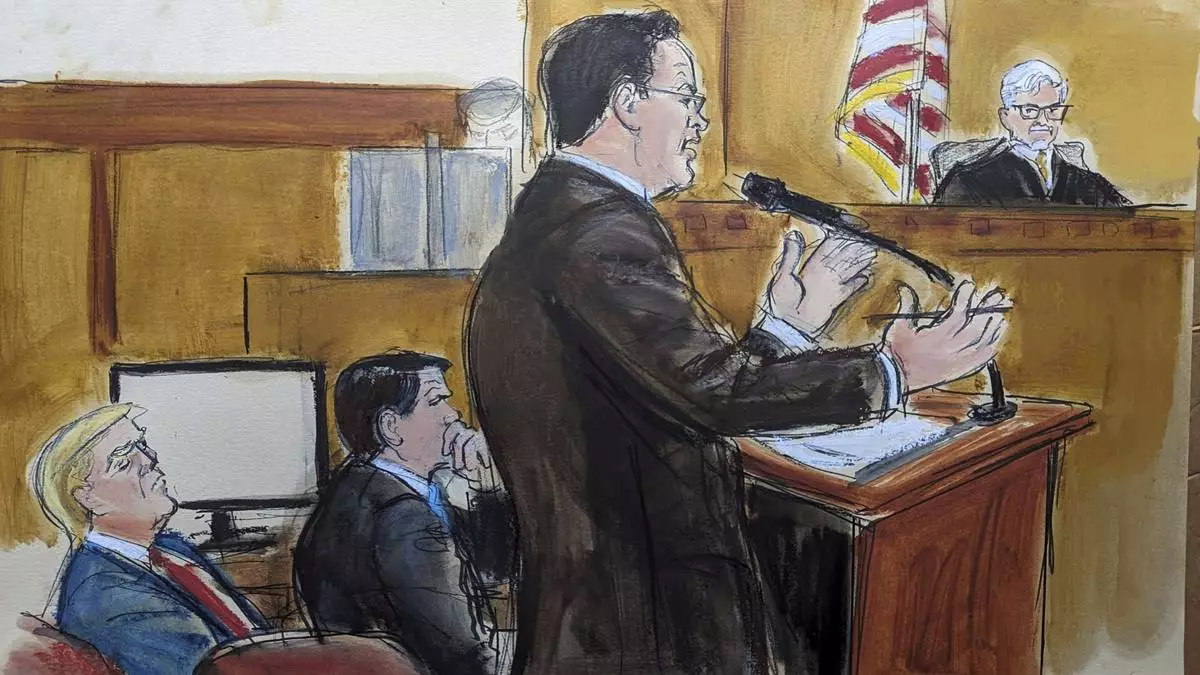
In this courtroom sketch, Tuesday, May 28, 2024, Assistant District Attorney Joshua Steingless delivers the prosecution closing arguments in Donald Trump's criminal trial, in New York. Trump is seated far left with eyes closed, beside his attorney Todd Blanche. Judge Juan Merchan is seated at upper right. (Elizabeth Williams via AP)
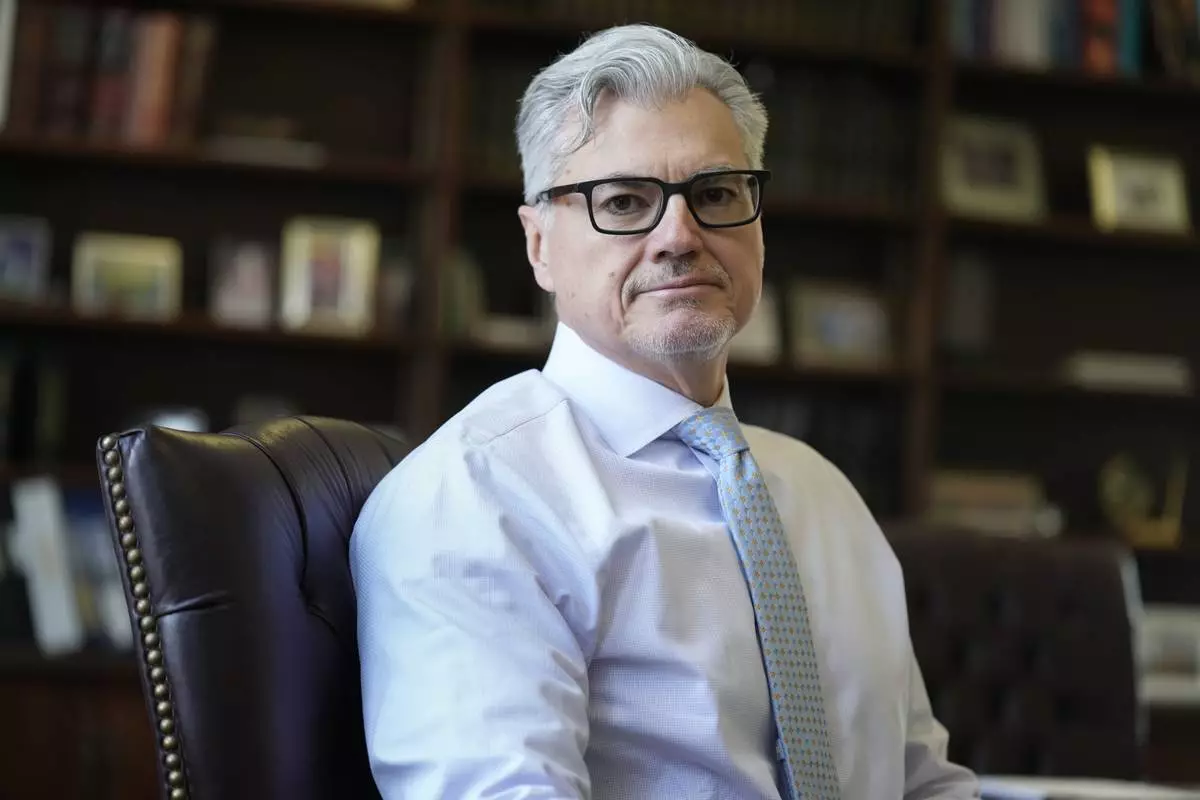
FILE - Judge Juan M. Merchan poses in his chambers in New York, March 14, 2024. The testimony in Donald Trump's hush money trial is all wrapped up after more than four weeks and nearly two dozen witnesses, meaning the case heads into the pivotal final stretch of closing arguments, jury deliberations and possibly a verdict. Merchan is expected to spend about an hour instructing the jury on the law governing the case, providing a roadmap for what it can and cannot take into account as it evaluates Trump's guilt or innocence. (AP Photo/Seth Wenig, File)

Former President Donald Trump speaks with attorney Todd Blanche and staff outside of the courtroom as jurors began deliberations for his criminal trial at Manhattan Criminal Court in New York on Wednesday, May 29, 2024. Trump was charged with 34 counts of falsifying business records last year, which prosecutors say was an effort to hide a potential sex scandal, both before and after the 2016 presidential election. Trump is the first former U.S. president to face trial on criminal charges. (Jabin Botsford/The Washington Post via AP, Pool)
A jury found a suburban Seattle police officer guilty of murder Thursday in the 2019 shooting death of a homeless man outside a convenience store, marking the first conviction under a Washington state law easing prosecution of law enforcement officers for on-duty killings.
After deliberating for three days, the jury found Auburn Police Officer Jeffrey Nelson guilty of second-degree murder and first-degree assault for shooting Jesse Sarey twice while trying to arrest him for disorderly conduct. Deliberations had been halted for several hours Wednesday after the jury sent the judge an incomplete verdict form Tuesday saying they were unable to reach an agreement on one of the charges.
The judge revealed Thursday that the verdict the jury was struggling with earlier in the week was the murder charge. They had already reached agreement on the assault charge.
Nelson was taken into custody after the hearing. He's been on paid administrative leave since the shooting in 2019. The judge set sentencing for July 16. Nelson faces up to life in prison on the murder charge and up to 25 years for first-degree assault. His lawyer said she plans to file a motion for a new trial.
Elaine Simons, who had been Sarey's foster mother, said the guilty verdicts provided resolution and peace for his family.
“This has been a long five years for a semblance of justice,” she told The Associated Press. “It has set a precedent for police officers to do what is right. The citizens of Auburn can have a sense of safety.”
Gary Damon, executive director of the Washington Coalition for Police Accountability, a group led by families who have lost loved ones to police violence, said the verdict was a significant step toward greater accountability for officers. Leslie Cushman, who was involved in the campaign to change the state's law to make it easier to charge officers, said the trial was profoundly important.
“Had this gone the other way, we would have had a serious disillusionment,” Cushman said. “This is good news and affirming for all who stand for justice.”
The King County Prosecuting Attorney's office thanked the jury for their efforts on the case, which has gone on for more than three weeks.
“We appreciate the hard work of all parties to get to these important verdicts,” spokesman Casey McNerthney said in an email. “All along we felt this was a case that needed to be tried before a jury. Our thoughts continue to be with Mr. Sarey’s loved ones.”
Prosecutors said Nelson punched Sarey several times before shooting him in the abdomen. About three seconds later, Nelson shot Sarey in the forehead. Nelson had claimed Sarey tried to grab his gun and a knife, so he shot him in self-defense, but video showed Sarey was on the ground reclining away from Nelson after the first shot.
The case was the second to go to trial since Washington voters in 2018 removed a standard that required prosecutors to prove an officer acted with malice — a standard no other state had. Now they must show the level of force was unreasonable or unnecessary. In December, jurors acquitted three Tacoma police officers in the 2020 death of Manuel Ellis.
Nelson had responded to reports of a man throwing things at cars, kicking walls and banging on windows in a shopping area in Auburn, a city of 70,000 about 28 miles (45 kilometers) south of Seattle. Callers said the man appeared to be high or having mental health issues.
Sarey was the son of survivors of the Khmer Rouge genocide in Cambodia and became homeless after aging out of foster care, his family said.
Nelson confronted Sarey in front of the store and attempted to get him into handcuffs. When Sarey resisted, Nelson tried to take Sarey down with a hip-throw and then punched him seven times. He pinned Sarey against the wall, pulled out his gun and shot him. Sarey fell to the ground.
Nelson’s gun jammed, he cleared it, looked around and then aimed at Sarey’s forehead, firing once more.
A witness, Steven Woodard, testified that after the first shot, “Mr. Sarey was ‘done,’ lying on the ground in a nonthreatening position.”
Nelson claimed Sarey tried to grab his gun, leading to the first shot. He said he believed Sarey had possession of his knife during the struggle and said he shot him in self-defense. Authorities have said the interaction lasted 67 seconds.
“Jesse Sarey died because this defendant chose to disregard his training at every step of the way,” King County Special Prosecutor Patty Eakes told the jury in her closing argument Thursday. The shooting was “unnecessary, unreasonable and unjustified,” she said.
Nelson’s attorney, Kristen Murray, told the jury officers are allowed to defend themselves.
“When Mr. Sarey went for Officer Nelson’s gun, he escalated it to a lethal encounter,” she said.
Auburn settled a civil rights claim by Sarey’s family for $4 million and has paid nearly $2 million more to settle other litigation over Nelson’s actions as a police officer.
Sarey was the third person Nelson has killed in his law enforcement career. Jurors did not hear evidence about Nelson’s prior uses of deadly force.
Prior to fatally shooting Sarey, Nelson killed Isaiah Obet in 2017. Obet was acting erratically, and Nelson ordered his police dog to attack. He then shot Obet in the torso. Obet fell to the ground, and Nelson fired again, fatally shooting Obet in the head. Police said the officer’s life was in danger because Obet was high on drugs and had a knife. The city reached a settlement of $1.25 million with Obet’s family.
In 2011, Nelson fatally shot Brian Scaman, a Vietnam War veteran with mental issues and a history of felonies, after pulling Scaman’s vehicle over for a burned-out headlight. Scaman got out of his car with a knife and refused to drop it; Nelson shot him in the head. An inquest jury cleared Nelson of wrongdoing.
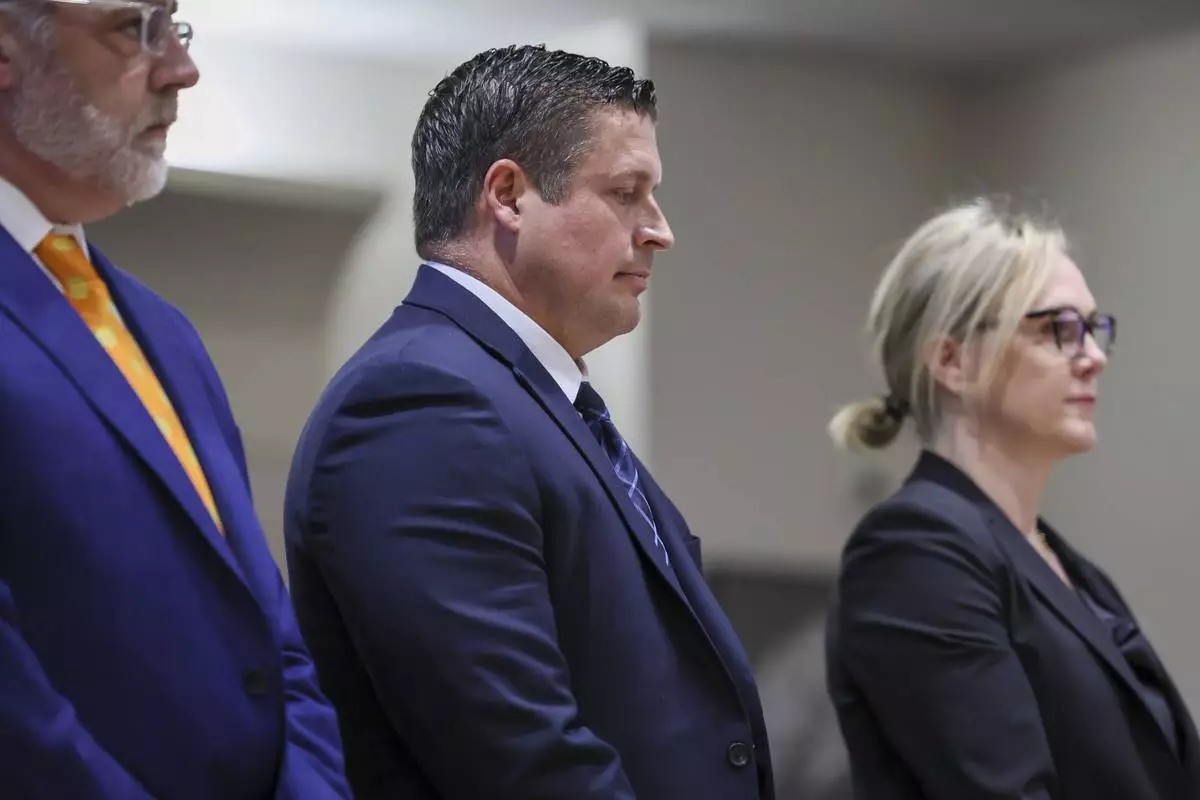
Jeffrey Nelson, flanked by attorneys, stands at the King County Maleng Regional Justice Center in Kent, Wash., on Thursday, June 27, 2024. A jury found the suburban Seattle police officer guilty of murder in the 2019 shooting death of a homeless man outside a convenience store, marking the first conviction under a Washington state law easing prosecution of law enforcement officers for on-duty killings. (Kevin Clark/The Seattle Times via AP)
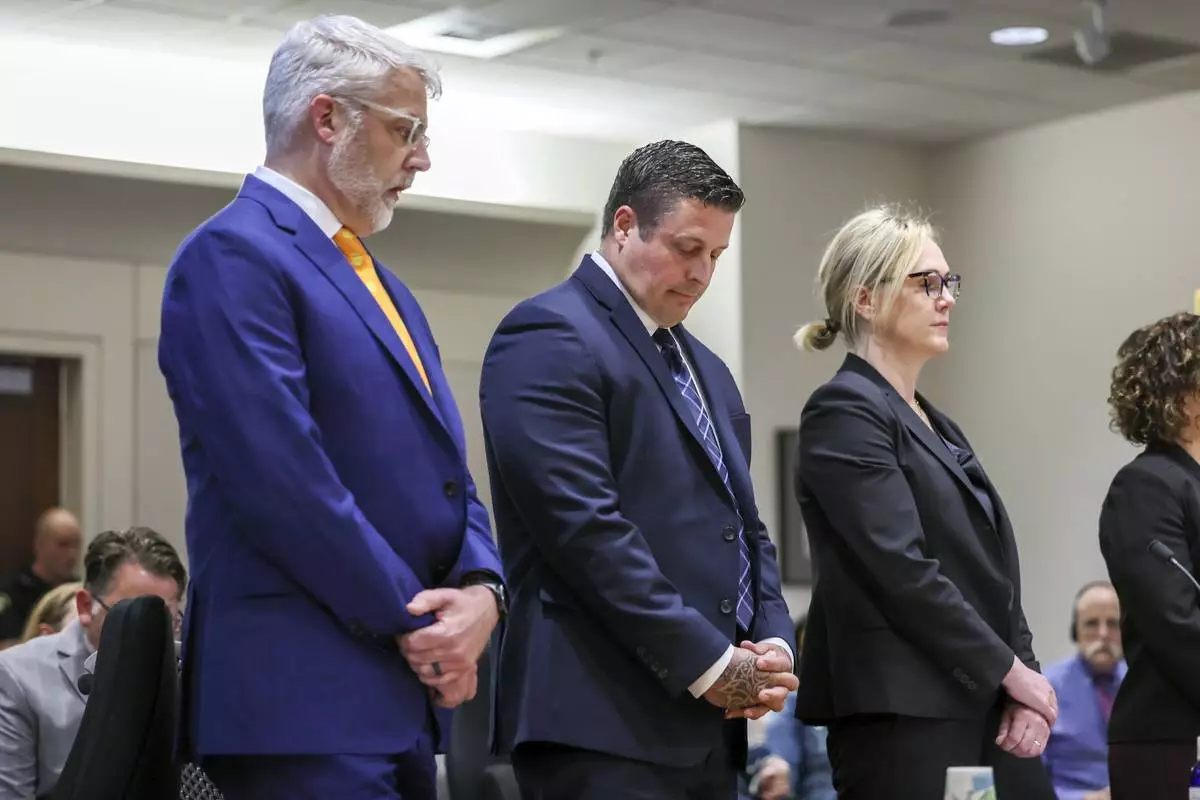
Jeffrey Nelson, flanked by attorneys, stands at the King County Maleng Regional Justice Center in Kent, Wash., on Thursday, June 27, 2024. A jury found the suburban Seattle police officer guilty of murder in the 2019 shooting death of a homeless man outside a convenience store, marking the first conviction under a Washington state law easing prosecution of law enforcement officers for on-duty killings. (Kevin Clark/The Seattle Times via AP)
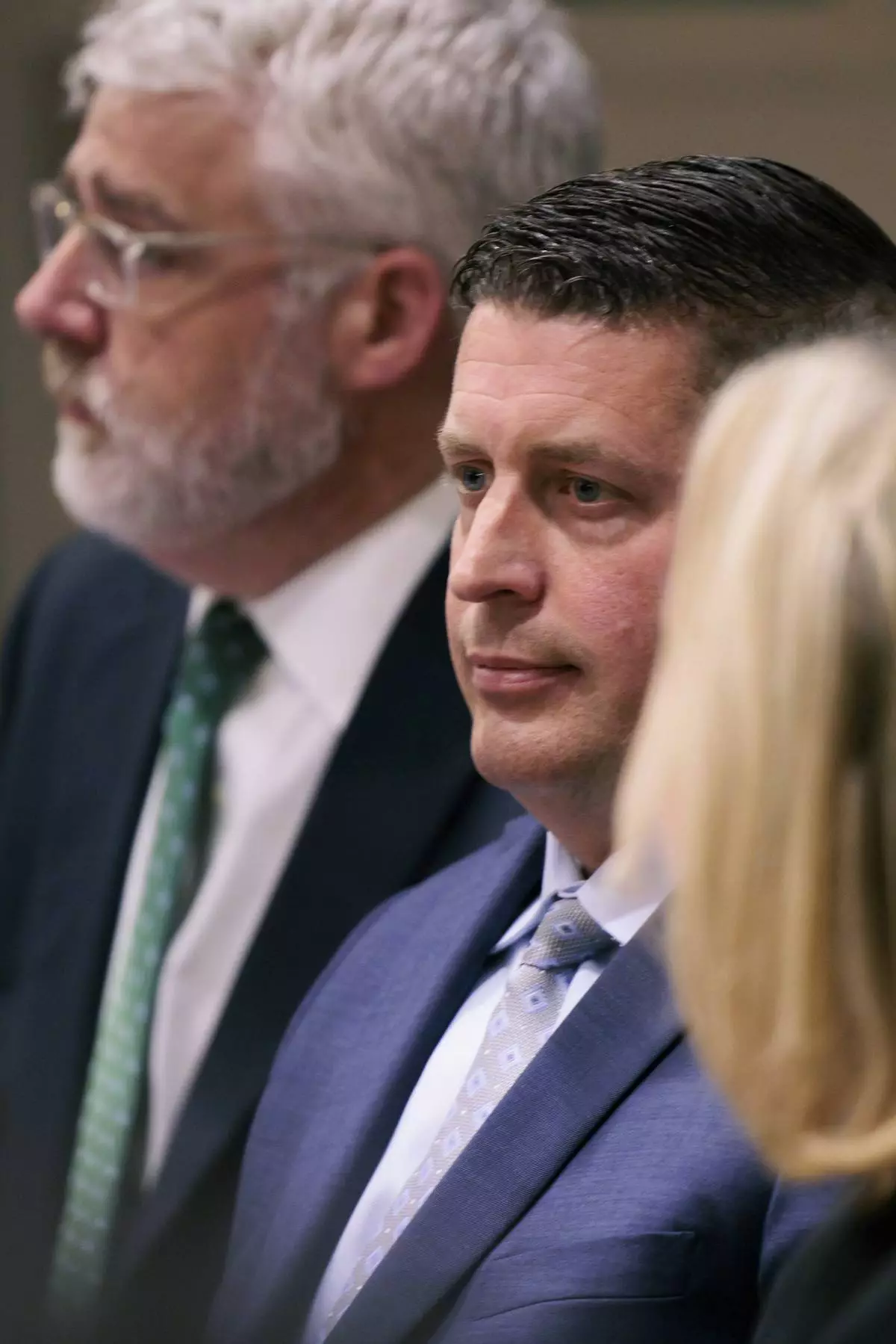
FILE - Auburn Police Officer Jeffrey Nelson, center, and defense attorney Tim Leary, behind, attend closing arguments, Thursday, June 20, 2024, at Maleng Regional Justice Center in Kent, Wash. A jury found the suburban Seattle police officer guilty of murder Thursday, June 27, in the 2019 shooting death of a homeless man outside a convenience store, marking the first conviction under a Washington state law easing prosecution of law enforcement officers for on-duty killings. (Erika Schultz/The Seattle Times via AP, File)
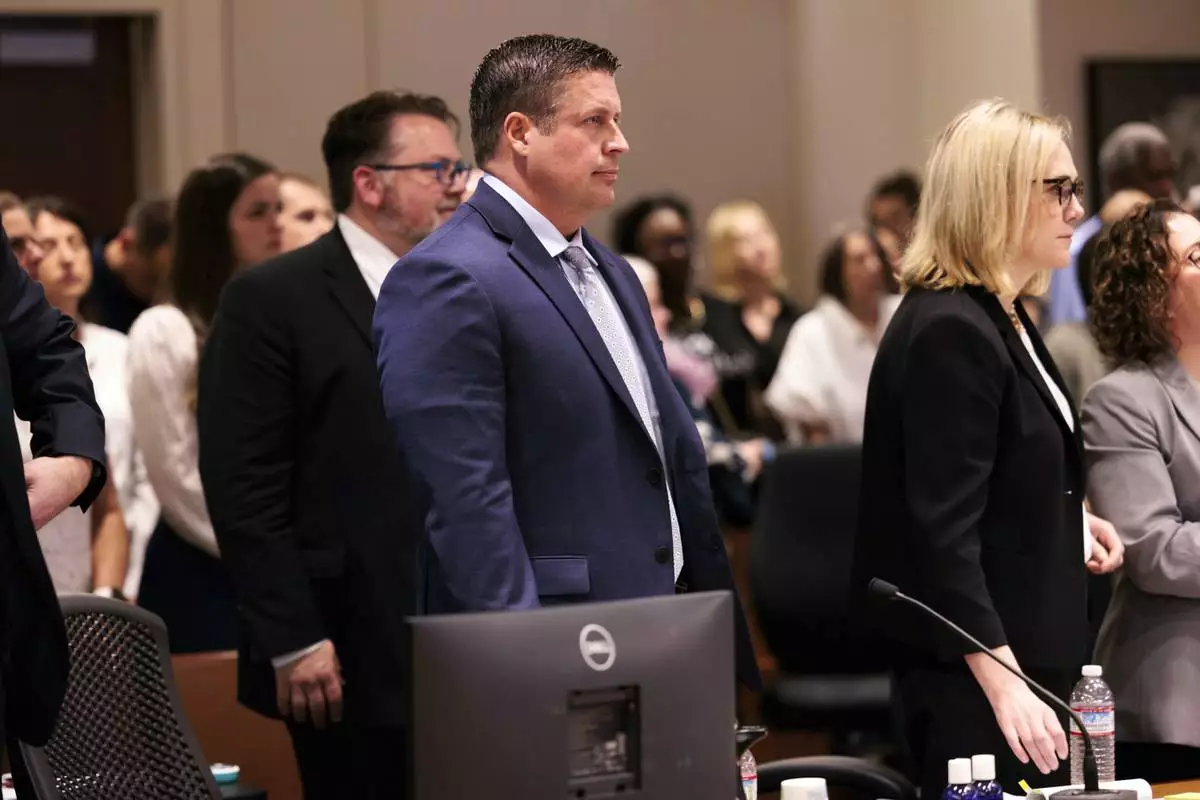
FILE - Auburn Police Officer Jeffrey Nelson, center, attends closing arguments in his trial, Thursday, June 20, 2024, at the Maleng Regional Justice Center in Kent, Wash. A jury found the suburban Seattle police officer guilty of murder Thursday, June 27, in the 2019 shooting death of a homeless man outside a convenience store, marking the first conviction under a Washington state law easing prosecution of law enforcement officers for on-duty killings. (Erika Schultz/The Seattle Times via AP, File)
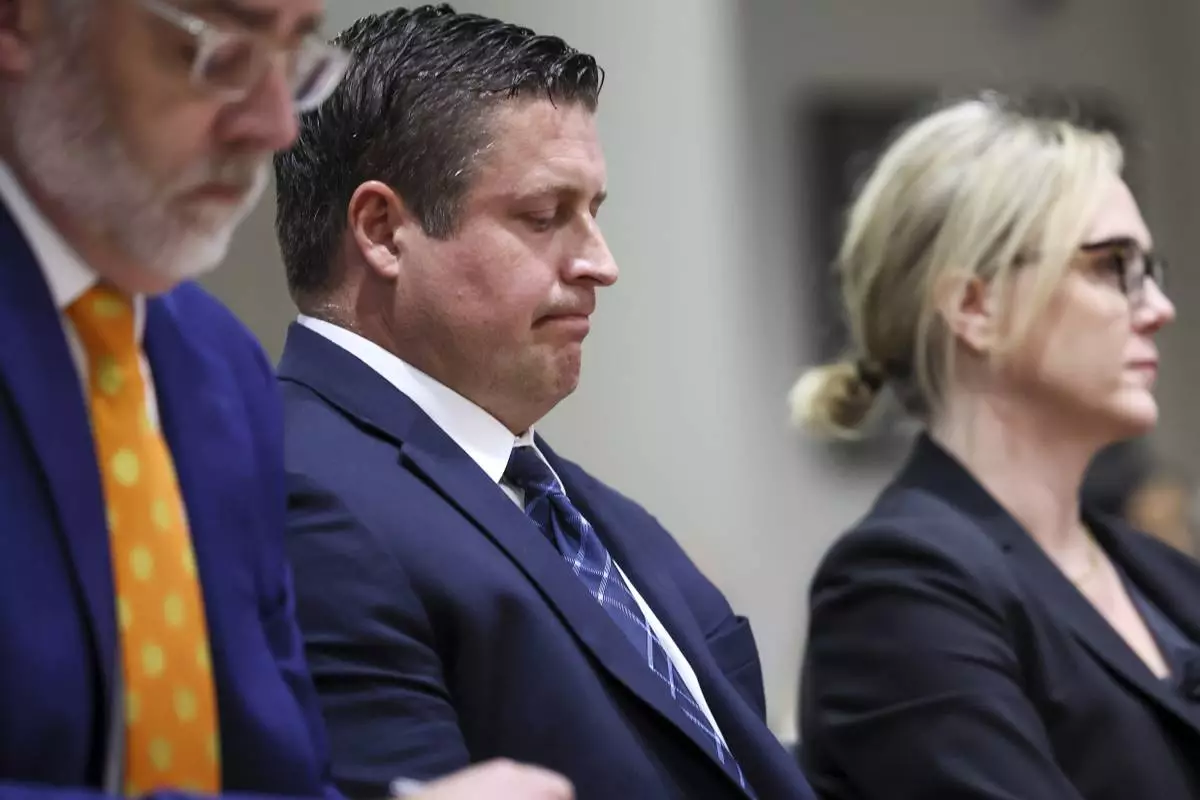
Jeffrey Nelson awaits the jury's verdict at the King County Maleng Regional Justice Center in Kent, Wash., on Thursday, June 27, 2024. (Kevin Clark/The Seattle Times via AP)
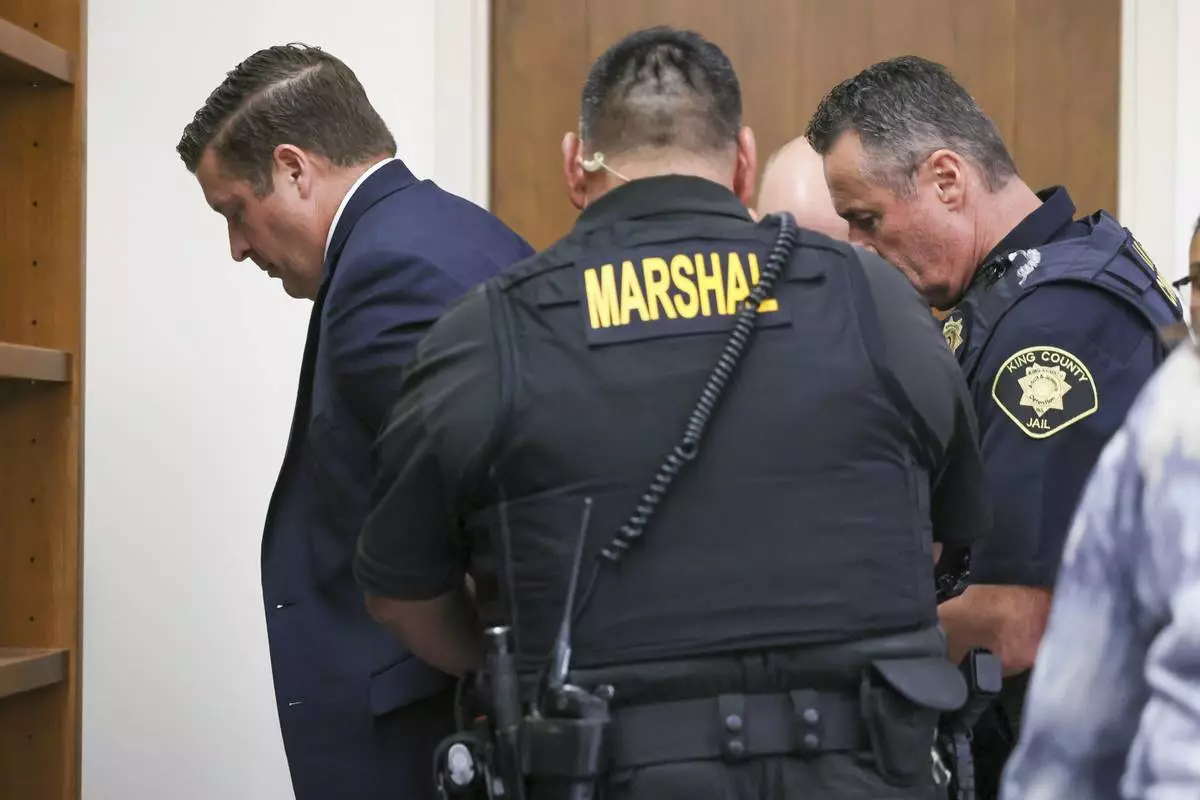
Auburn Police Officer Jeffrey Nelson is taken into custody after two guilty verdicts were headed down by the jury Thursday at the King County Maleng Regional Justice Center in Kent, Wash., on Thursday, June 27, 2024. Nelson was found guilty of second-degree murder and first-degree assault for shooting Jesse Sarey twice while trying to arrest him for disorderly conduct. (Kevin Clark/The Seattle Times via AP)
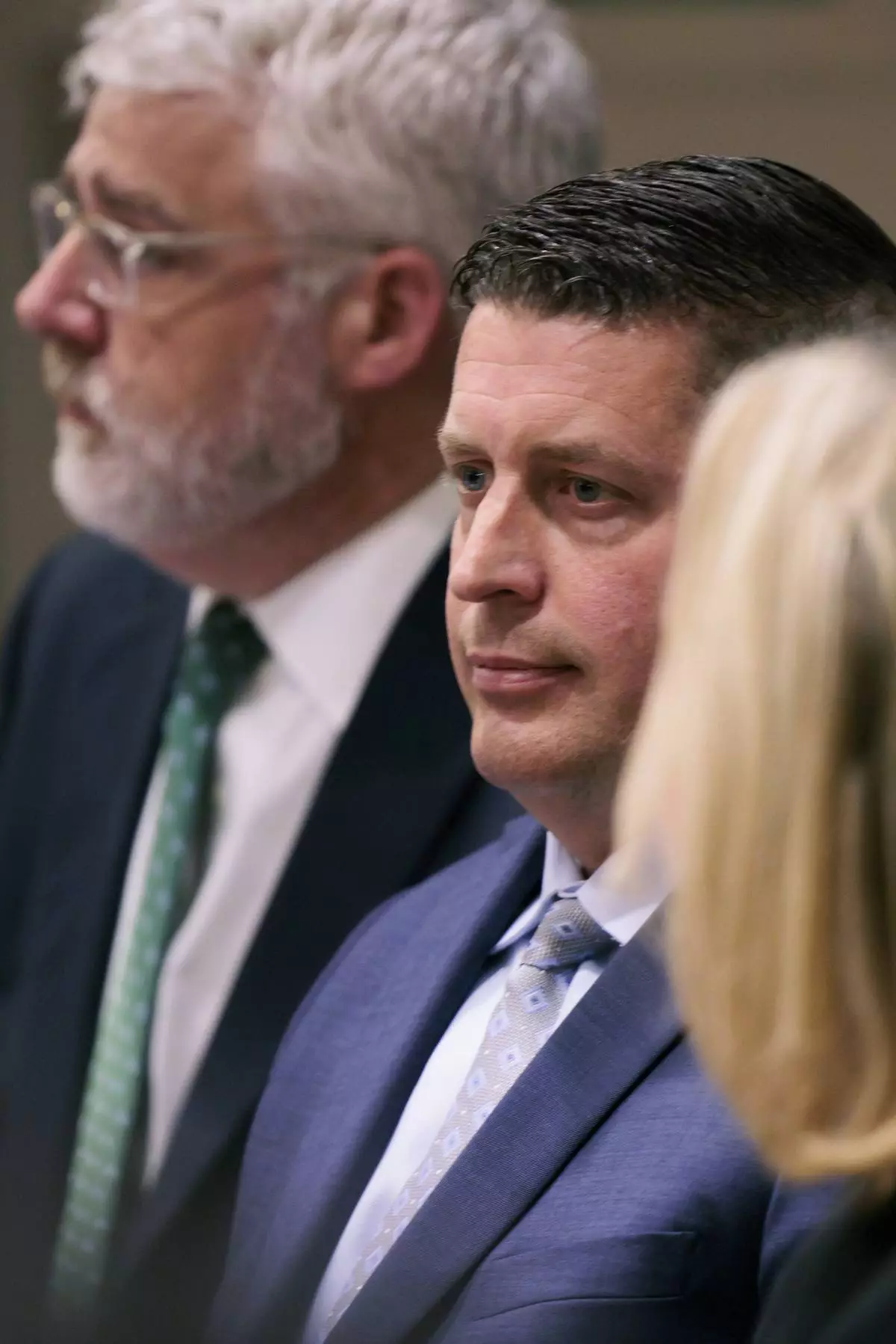
Auburn Police Officer Jeffrey Nelson, center, and defense attorney Tim Leary, behind, attend closing arguments at Maleng Regional Justice Center in Kent, Wash., Thursday, June 20, 2024. Officer Nelson is charged with fatally shooting Jesse Sarey, 26, while attempting to arrest him for disorderly conduct on May 31, 2019. (Erika Schultz/The Seattle Times via AP)
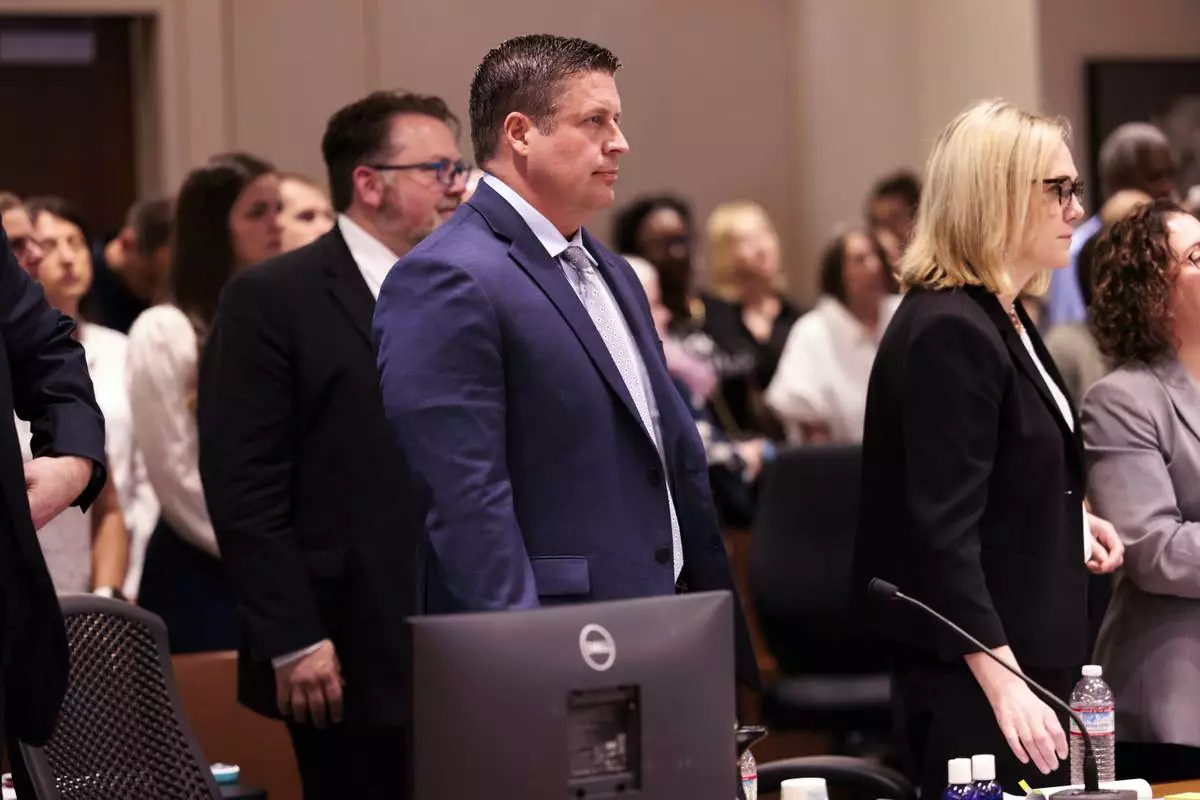
Auburn Police Officer Jeffrey Nelson, center, attends closing arguments in his trial, Thursday, June 20, 2024, at the Maleng Regional Justice Center in Kent, Wash. Officer Nelson is charged with fatally shooting Jesse Sarey, 26, while attempting to arrest him for disorderly conduct on in 2019. (Erika Schultz/The Seattle Times via AP)




















